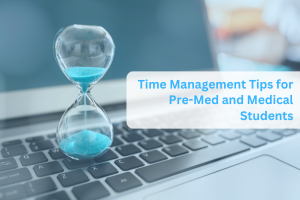If you’re the typical pre-med, you’ve probably read half a dozen articles on the importance of conducting research for your application to medical school. I’m only a first-year medical student, but I’m comfortable diagnosing most pre-meds with tunnel vision. We’re hyper-focused on clinching that much sought-after acceptance letter to the point where we lose sight as to why we engage in research in the first place. But take a step back for a moment and look at the bigger picture when asking yourself why you should be involved in research.
Everything you learn in your textbook comes from research. Every cellular pathway, medication, and surgical technique that is common knowledge and practice now was once cutting-edge in the past. Death is pushed slightly further from our doorstep every year thanks to the work of tremendous scientists. Research is very much at the heart of medicine, so much so that to separate the two would be to drive a car with an engine. Thankfully, the importance of research has not been lost on the medical community. The Association of American Medical Colleges (AAMC), which administers the MCAT, correctly insists that “tomorrow’s physicians need broader skills and knowledge than in the past.” With thousands of articles being published annually and guidelines changing frequently, physicians need to be proficient consumers of research. One of the best ways to be so is to be active in research.
Given the importance of research experience when applying to medical school, pre-meds often scramble to find whatever opportunity that may be available, but they normally do so haphazardly. In this post, I’ll share some tips on finding the right position for you, dispel some common misconceptions, and highlight research opportunities looking for students.
Getting Started
Here are some practical steps to make the most out of your undergraduate research experience:
-
- Find your passion. What interests you? Does elucidating the role of epigenetics in the pathophysiology of type 1 diabetes excite you? How about studying the social determinants of mental health? Note that your interests don’t need to be medically related. Once you figure out where your passion lies, start looking for potential supervisors. Admission committees can tell the difference between someone who did research for the sake of adding it to their resume and those who are truly invested in the experience. Meaningful research experience can be gauged by the amount of time you dedicate to the lab and the fruits of your labour in the form of publications, presenting at conferences, or developing a new protocol.
-
- You may want to start off slow. Don’t dive head first into the unknown. Every lab has its own dynamic. Find out if the lab is right for you first before committing to it. Ask to meet with the supervisor and speak with lab members to get a better understanding of the lab’s culture and precise research interests. Consider volunteering and joining the lab for weekly discussions (most labs dedicate a few hours a week to discuss their research progress and recent publications in their field of study). This will be a great way to see if you’d be a good fit in the lab and if the lab is a good fit for you.
-
- Start early. It takes time to learn all the fancy lab techniques and confusing statistical analyses, conduct experiments, and publish your results, so get a head start and look for opportunities as soon as possible.
-
- Don’t fret a skimpy CV. I contacted my first potential supervisor in my first year as an undergraduate. He promptly responded and asked for a copy of my CV. After finding out what a CV was and creating one (I was 18, cut me some slack), I looked over it and rhetorically asked myself, “Why would being a paperboy for two years be of any consequence to Dr. X? I have nothing of value to contribute to his lab.”Potential supervisors know that you’re not a Postdoctoral fellow with publications in Nature and Cell to boast about, and that you’ll be coming to the lab as something of a blank slate. That’s okay. They will be willing to invest time into you, but this will be a two-way relationship. In return, they will expect dedication, constant skill progression, and a willingness to take on greater roles in the lab over time. Be ready for such a commitment and always maintain open communication with your supervisor. Despite lacking any technical skills, the supervisor decided to take me on given my enthusiasm and commitment.
-
- Grades come first. It’s common for pre-meds to bite off more than they can chew. If you’re finding it hard to balance your academic work, hold off on starting a research project during the school year. Instead, see if you could work in a lab during the summer. Many labs offer summer research positions and awards (e.g. NSERC grants).
- Be ready for setbacks. Research can be incredibly frustrating and time-consuming. Your experiments will fail. Your papers will be rejected (the same paper may be rejected several times). You’ll come to a point where ask yourself if it’s all worth it. But you’ll have wins along the way, sometimes small, other times large. Feed off these little victories and don’t let the setbacks get you down. Even the best go through it. As Nobel Prize laureate Shinya Yamanaka says about his time in the lab, “Usually it’s just failure. Failure, failure, failure, success.”
Resources
The following institutions regularly accept research students throughout the year as volunteers or paid summer students. This list is by no means exhaustive, so feel free to do your own bit of searching for other opportunities.
The Mount Sinai Hospital Student Research Program
Lunenfeld-Tanenbaum Research Institute for undergraduate students
St. Michael’s Hospital Summer Student (KRSS) Program
UHN Education Programs at Princess Margaret
Sunnybrook Research Institute for summer students
When writing this article, I was tempted to wrap it up by saying that despite all its challenges, research can be an incredibly fruitful and fulfilling endeavour. This completely misses the point. It’s because of these challenges that research can be such a satisfying pursuit. Research presents the opportunity to grow as a creative thinker, meet inspirational mentors, and contribute your humble share to humanity’s collective knowledge. I know that research will play an integral role in my career as a physician, and I encourage you to find out if it will for yours!


